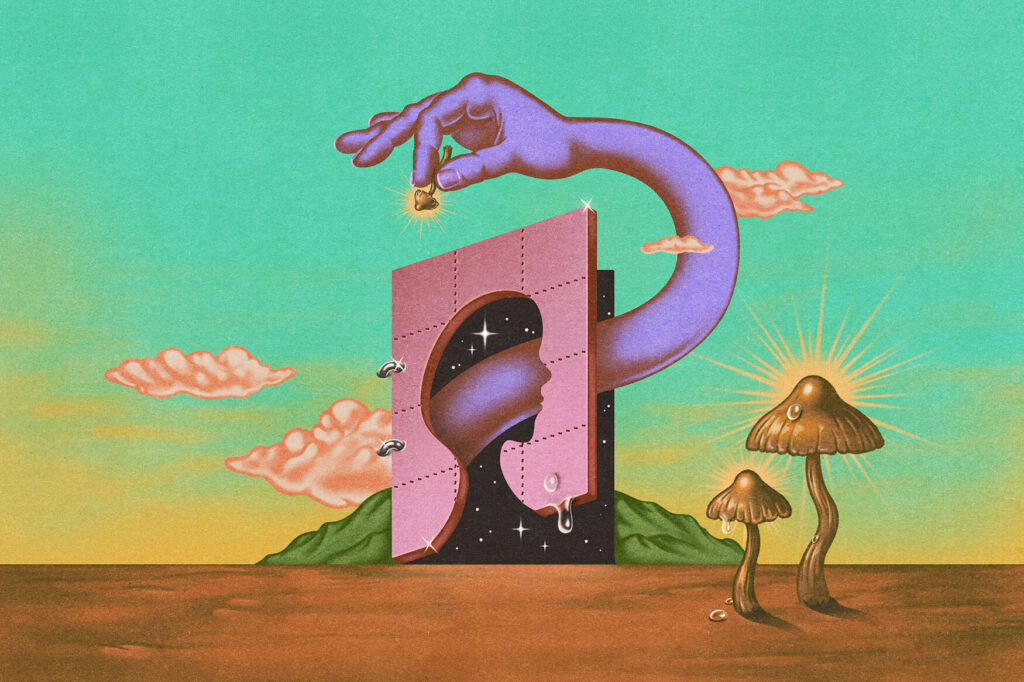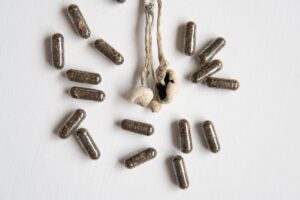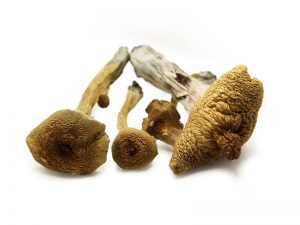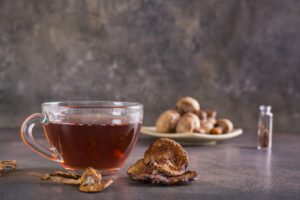No products in the cart.

Comparing Mushroom Microdosing Effects And Mushroom tea Effects
Mushroom Microdosing Effects vs. Mushroom Tea Effects: Understanding the Difference
The effects of mushroom microdosing and mushroom tea differ primarily in intensity, duration, and purpose due to the varying amounts of psilocybin consumed and how it’s metabolized by the body. Here’s an explicit breakdown:
1. Mushroom Microdosing
- Definition: Microdosing involves consuming a very small, sub-perceptual dose of psilocybin (typically 0.1g to 0.3g of dried mushrooms).
- Effects:
- Subtle and often unnoticed but can include:
- Enhanced focus and creativity.
- Improved mood and emotional balance.
- Increased productivity or flow state.
- Slightly heightened senses without hallucinations.
- Effects are more cumulative than immediate, making it suitable for long-term benefits over several weeks.
- Does not produce a “trip” or significant alterations in reality.
- Subtle and often unnoticed but can include:
- Purpose:
- Used for personal growth, emotional regulation, and cognitive enhancement.
- Often part of wellness routines, aiming for subtle improvements in mental clarity and stability.
- Duration: Mild effects lasting 4–6 hours, often integrating seamlessly into daily life.

Detailed Effects of Mushroom Microdosing
Microdosing psilocybin mushrooms involves consuming sub-perceptual amounts (typically 0.1–0.3 grams) to enhance mental, emotional, and physical well-being without inducing a full psychedelic experience. Here’s a breakdown of its effects:
1. Cognitive Benefits
- Increased Focus and Concentration:
Microdosing can help sharpen attention and improve task efficiency. Many users report being able to tackle complex problems with enhanced clarity. - Boosted Creativity:
Psilocybin enhances divergent thinking, helping users think outside the box, connect ideas, and find innovative solutions. - Improved Learning and Memory:
Small doses may support neuroplasticity, the brain’s ability to form and reorganize synaptic connections, enhancing learning and recall.
2. Emotional Effects
- Elevated Mood:
Psilocybin can stimulate serotonin receptors, reducing feelings of anxiety, depression, and negativity, and promoting a more optimistic outlook. - Reduced Stress and Anxiety:
Users often feel a greater sense of calm and resilience, making it easier to handle stressors. - Increased Emotional Awareness:
Microdosing can heighten sensitivity to emotions, enabling better understanding and management of personal feelings and relationships.
3. Physical Well-Being
- Enhanced Energy Levels:
Users often experience mild but sustained energy, without the jitteriness associated with caffeine. - Improved Sleep Patterns:
Many report better sleep quality and more vivid dreams, as psilocybin interacts with the brain’s regulatory systems. - Relief from Chronic Pain:
Some anecdotal reports suggest that microdosing may help alleviate migraines and cluster headaches.
4. Social and Interpersonal Effects
- Better Social Interaction:
Increased empathy and reduced social anxiety make it easier to connect with others. - Greater Patience and Tolerance:
Users often feel less reactive, with a heightened ability to navigate difficult conversations or conflicts.
5. Spiritual and Existential Insights
- Heightened Mindfulness:
Many find themselves more present and aware of their surroundings, appreciating life’s subtleties. - Deeper Sense of Purpose:
Regular microdosing can prompt a reevaluation of goals and priorities, fostering personal growth.
Potential Downsides
- Overstimulation:
In rare cases, microdosing may cause restlessness or difficulty concentrating. - Heightened Sensitivity:
For some, emotional or sensory overstimulation may occur. - Tolerance Development:
Regular use without breaks can reduce effectiveness over time.
How It Works
Psilocybin in mushrooms is converted into psilocin, which interacts with serotonin receptors (primarily 5-HT2A) in the brain. This interaction enhances connectivity between brain regions, leading to improved cognitive flexibility, emotional processing, and perception.
Best Practices
- Follow a Schedule:
Popular protocols include the Fadiman Protocol (one day on, two days off) and the Stamets Stack (microdosing with additional supplements). - Start Low and Adjust:
Begin with 0.1g to assess sensitivity, then adjust as needed. - Set Clear Intentions:
Decide on specific goals (e.g., reducing anxiety, boosting creativity) to guide the experience.
2. Mushroom Tea
- Definition: Mushroom tea involves brewing a larger dose of psilocybin mushrooms (commonly 1–5g or more) into a liquid, often with added ingredients like ginger or honey to improve taste and reduce nausea.
- Effects:
- Pronounced and can include:
- Altered perception of reality (e.g., vivid visuals, time distortion, enhanced colors).
- Profound emotional or spiritual experiences.
- Enhanced introspection or a sense of interconnectedness.
- Euphoria or, in some cases, anxiety depending on the setting and dose.
- The onset is typically faster than consuming dried mushrooms directly due to quicker absorption.
- Pronounced and can include:
- Purpose:
- Often used for deep introspection, spiritual journeys, or therapeutic purposes.
- Can also be recreational for those seeking a more immersive psychedelic experience.
- Duration: Effects usually last 4–8 hours, with the peak occurring 1–2 hours after consumption.


Key Differences
| Aspect | Microdosing | Mushroom Tea |
|---|---|---|
| Dose | Very low (0.1–0.3g) | Higher (1–5g or more) |
| Effects | Subtle, non-psychedelic | Intense, potentially psychedelic |
| Purpose | Daily life enhancement, emotional balance | Spiritual/therapeutic journeys or recreation |
| Onset | Gradual (subtle increase in mood/energy) | Fast (15–30 minutes post-consumption) |
| Duration | ~4–6 hours (barely noticeable) | 4–8 hours (noticeable peak effects) |
